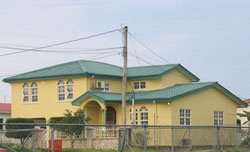 Toledo, a district in the south of Belize. I went with my friend Carmen from New York and Barbara, the wife of the new American ambassador. Toledo is the least developed district of Belize, a bit like 'the slow kid in class'. For example only 1 out of 4 households has access to a sewer system, against more than half country-wide; adult literacy is 62% (77% country-wide) and the under 5 mortality rate is 1.5 times higher than the national average. Toledo is covered with pristine tropical rain forests and its population is largely made up of Mopan and Kekchi Mayas living in over 30 villages. This combination of lush green vegetation and Mayan houses makes it absolutely scenic...like a front page picture of National Geographic.
Toledo, a district in the south of Belize. I went with my friend Carmen from New York and Barbara, the wife of the new American ambassador. Toledo is the least developed district of Belize, a bit like 'the slow kid in class'. For example only 1 out of 4 households has access to a sewer system, against more than half country-wide; adult literacy is 62% (77% country-wide) and the under 5 mortality rate is 1.5 times higher than the national average. Toledo is covered with pristine tropical rain forests and its population is largely made up of Mopan and Kekchi Mayas living in over 30 villages. This combination of lush green vegetation and Mayan houses makes it absolutely scenic...like a front page picture of National Geographic.The UN supports the district in many ways; UNICEF assists with early-childhood development activities and upgrades of school toilets, UNDP has agricultural and environmental protection programs and PAHO/WHO supports the local hospitals with outreach programs on nutrition, child measurements and promotion of breast-feeding.
We left the district with mixed feelings; impressed by a program named Roving Caregivers, where young Maya women are trained to become informal caregivers or rovers to young children who do not have access to daycare. The rover goes to the homes of the Maya mothers to play with the children and teach the parents about parenting and child development. We were equally impressed by Ya'axche Conservation Trust, which manages large areas of protected nature reserve and assists farmers with sustainable livelihood such as organic cacao and coffee beans. The least impressed we were by the WASH project; for water, sanitation and hygiene in schools. Though highly relevant, the project started but was not complete, leaving many school principals frustrated about their sanitary facilities and more importantly, leaving entire classes with smelly toilets, unused washing buildings and broken water fountains.
Why are these results so mixed? There a plenty factors contributing to both failure and success. Poor planning, lack of ownership of projects, political instability and staff turn-over within UN agencies, are definitely spoilers. Proper monitoring and selection of intervention partners are enablers. My conclusion is that implementing social projects in developing countries is a bit like life itself...you win some, you lose some.






































Awesome article, it was exceptionally helpful! I simply began in this and I'm becoming more acquainted with it better! Cheers, keep doing awesome! Baton Rouge portable toilets
ReplyDelete